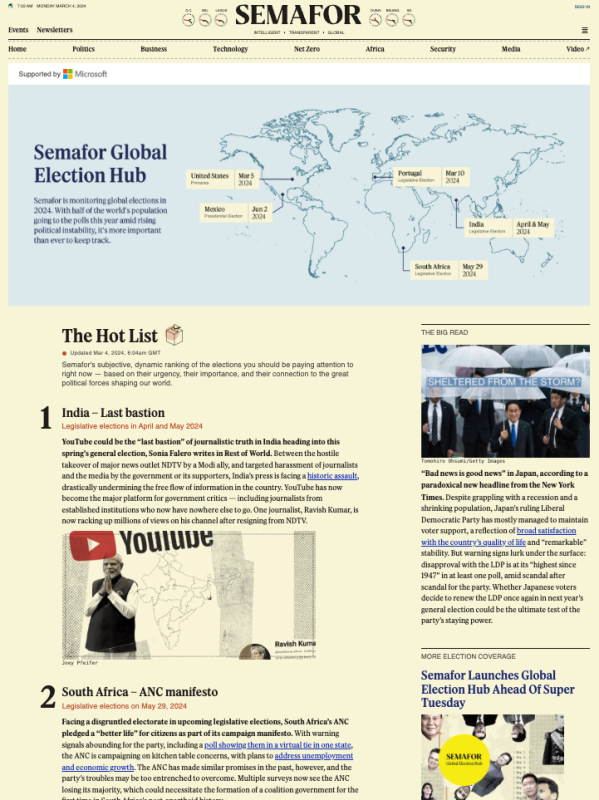[ad_1]
Semafor has launched a Microsoft-sponsored “Global Election Hub” to cover the numerous votes happening around the world in 2024.
The product’s announcement comes soon after Semafor rolled out a new “Insights” story format, also supported by Microsoft, which uses generative AI to find additional angles on news stories the newsroom might otherwise have missed.
It also comes the day before Super Tuesday, when voters in 15 US states vote in presidential primary elections.
More than 50 countries representing more than two billion people are expected to go to the polls in 2024.
Semafor’s Global Election Hub: ‘What readers are looking for these days is actually human editorial judgement’
The Global Election Hub webpage is dominated by a “Hot List” which Semafor calls a “subjective, dynamic ranking of the elections you should be paying attention to right now — based on their urgency, their importance, and their connection to the great political forces shaping our world”. The page also rounds up global election coverage from across semafor.com, with the goal of being a one-stop shop for audiences interested in keeping abreast of the international electoral news.
The inaugural Hot List ranking places India first out of nine entries and summarises a December feature from tech news outlet Rest of World reporting that Youtube could be the “last bastion” for journalism in the country.

Other countries highlighted in the list on Monday morning included Italy, Panama, Russia and the US.
Semafor said in a release on Monday that the Global Election Hub “will track critical races, highlight electoral trends and ballot updates, and provide deep context”, and that the Hot List would spotlight “the most consequential elections happening across the globe, eschewing numerical jargon and two dimensional data coverage”.
The global news start-up’s editor Ben Smith told Press Gazette that he expects this year “the US media, and to some extent the global media, will be totally obsessed with the US election, with Trump. I mean, rightly, because it’s so important.
“But I think it’s hard to understand the Trump story if you’re not seeing similar patterns around the world and understanding what is distinctly American and what’s part of these tectonic shifts in global politics.”
The Global Election Hub lives on Semafor’s website, which is un-paywalled and pitched at an international, educated audience. Asked how the Global Election Hub differs from, for example, the world news pages on bbc.co.uk or nytimes.com, Smith emphasised the Hot List, which he thought would be “actually the most interesting part”.
“What makes it interesting is there’s an incredibly busy, chaotic year, but there are threads,” Smith said. One of those threads is “the rise of right-wing populism… in a very particular recognisable form – recognisable even, sometimes, by the haircut”. Another is “these ‘elections’ where you have authoritarian leaders who still feel compelled to hold elections”.
“There are small countries where the trends are really interesting – like in Sri Lanka you have communists in the election, which is interesting and new. And in Romania you have an opposition party which recently was bumping up in the polls and who believe that Romania includes a big section of Hungary.”
Readers today are looking for ‘human editorial judgement’
Deciding which global races Semafor will spotlight on any given day will have to be a subjective editorial call, he noted.
“We don’t want to pretend otherwise,” Smith said. “I think broadly, what readers, actually, are looking for these days – in a period where the algorithms are all kind of spinning out and you have AI-generated content all over the place – is actually human editorial judgement.”
That judgement, he hopes, will help cut through information overload: “Here’s a destination and an intelligent way to stay across both these specific elections – and also, in some ways more important, the trends that connect them.
“We’re not building a [election data site] 538-style polling centre for 200 countries. I mean, we are aware of the limitations of this. I had some fantasy of building a needle that would tell you whether populism was winning or losing today, but got talked out of it by people who, you know, know math.”
But Smith said he was excited about the effort.
“It just feels like this is something that Twitter used to do well, and now does badly. And that there’s a real opportunity for journalists to, I don’t know, in some ways reclaim the job of telling these big complicated stories over time.”
The post Semafor extends Microsoft sponsorship with global election hub appeared first on Press Gazette.
[ad_2]
Source link


